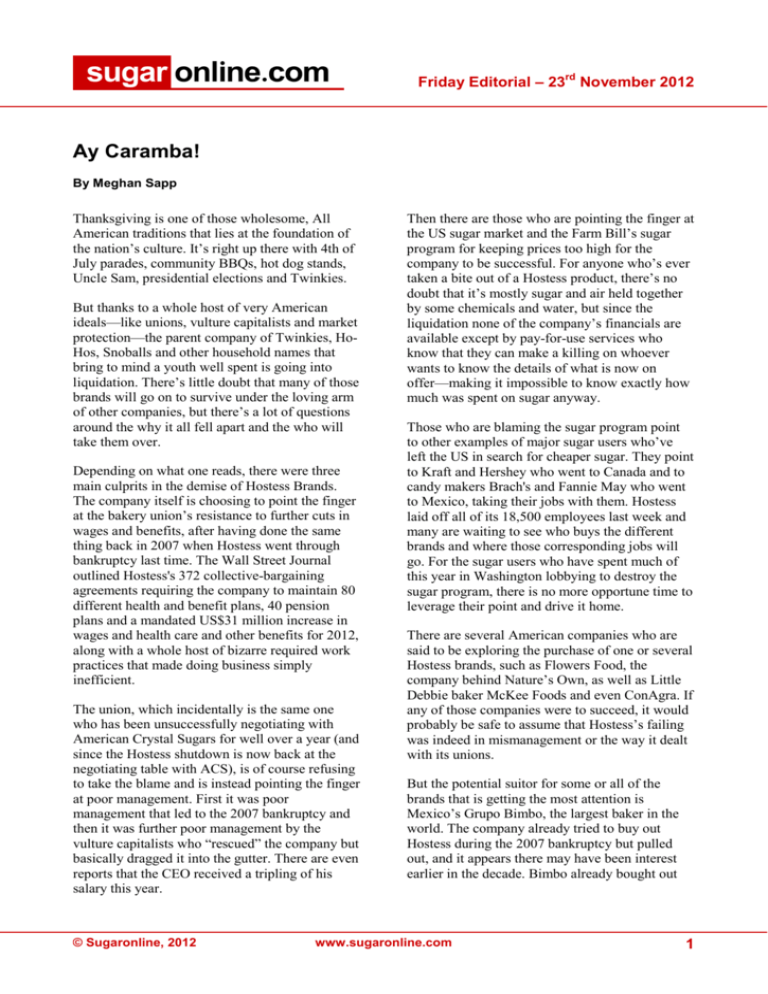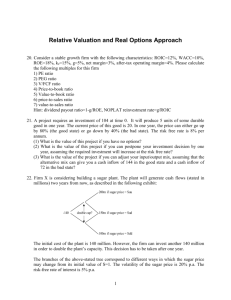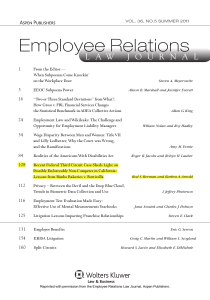Ay Caramba! - Sugaronline
advertisement

Friday Editorial – 23rd November 2012 Ay Caramba! By Meghan Sapp Thanksgiving is one of those wholesome, All American traditions that lies at the foundation of the nation’s culture. It’s right up there with 4th of July parades, community BBQs, hot dog stands, Uncle Sam, presidential elections and Twinkies. But thanks to a whole host of very American ideals—like unions, vulture capitalists and market protection—the parent company of Twinkies, HoHos, Snoballs and other household names that bring to mind a youth well spent is going into liquidation. There’s little doubt that many of those brands will go on to survive under the loving arm of other companies, but there’s a lot of questions around the why it all fell apart and the who will take them over. Depending on what one reads, there were three main culprits in the demise of Hostess Brands. The company itself is choosing to point the finger at the bakery union’s resistance to further cuts in wages and benefits, after having done the same thing back in 2007 when Hostess went through bankruptcy last time. The Wall Street Journal outlined Hostess's 372 collective-bargaining agreements requiring the company to maintain 80 different health and benefit plans, 40 pension plans and a mandated US$31 million increase in wages and health care and other benefits for 2012, along with a whole host of bizarre required work practices that made doing business simply inefficient. The union, which incidentally is the same one who has been unsuccessfully negotiating with American Crystal Sugars for well over a year (and since the Hostess shutdown is now back at the negotiating table with ACS), is of course refusing to take the blame and is instead pointing the finger at poor management. First it was poor management that led to the 2007 bankruptcy and then it was further poor management by the vulture capitalists who “rescued” the company but basically dragged it into the gutter. There are even reports that the CEO received a tripling of his salary this year. © Sugaronline, 2012 Then there are those who are pointing the finger at the US sugar market and the Farm Bill’s sugar program for keeping prices too high for the company to be successful. For anyone who’s ever taken a bite out of a Hostess product, there’s no doubt that it’s mostly sugar and air held together by some chemicals and water, but since the liquidation none of the company’s financials are available except by pay-for-use services who know that they can make a killing on whoever wants to know the details of what is now on offer—making it impossible to know exactly how much was spent on sugar anyway. Those who are blaming the sugar program point to other examples of major sugar users who’ve left the US in search for cheaper sugar. They point to Kraft and Hershey who went to Canada and to candy makers Brach's and Fannie May who went to Mexico, taking their jobs with them. Hostess laid off all of its 18,500 employees last week and many are waiting to see who buys the different brands and where those corresponding jobs will go. For the sugar users who have spent much of this year in Washington lobbying to destroy the sugar program, there is no more opportune time to leverage their point and drive it home. There are several American companies who are said to be exploring the purchase of one or several Hostess brands, such as Flowers Food, the company behind Nature’s Own, as well as Little Debbie baker McKee Foods and even ConAgra. If any of those companies were to succeed, it would probably be safe to assume that Hostess’s failing was indeed in mismanagement or the way it dealt with its unions. But the potential suitor for some or all of the brands that is getting the most attention is Mexico’s Grupo Bimbo, the largest baker in the world. The company already tried to buy out Hostess during the 2007 bankruptcy but pulled out, and it appears there may have been interest earlier in the decade. Bimbo already bought out www.sugaronline.com 1 23rd November 2012 Sugaronline Friday Editorial parts of Sara Lee last year, but not all of it because of anti-trust issues. Those who are backing Bimbo as the lead suitor are pointing to the company’s access to cheap Mexican sugar and the company’s extremely healthy balance sheet as the key factors to why Bimbo may come out as the winner. Though sugar in Mexico continues to be cheaper than the US, the new dynamics that exist with NAFTA might not necessarily mean that Bimbo could get cheap sugar into the US. It does own US-based manufacturing as a result of previous acquisitions, but if Hostess failed because of high sugar prices, Bimbo would need cheap sugar. That could mean that in order to take advantage of the Mexico/US sugar arbitrage, production would have to move to Bimbo’s production facility in Mexicali, Mexico and take along all of those jobs with it. purchase of just a few brands, or what kinds of “yes, but” clauses might be attached to any sort of approval, but there’s little doubt that those are the kinds of discussions going on right now in Washington while everyone is busy digesting their turkey and pumpkin pie. The average American populace does not have a favourable worldview when it comes to Mexico or Mexicans. The country is for holiday destinations like Mazatlan or Cancun, their food is pretty well loved throughout the US in varying levels of authenticity, but Mexicans are basically seen as the lowest of the lower class. A Mexican company taking over something as all around American as the Twinkie or the Ho-Ho would be almost unfathomable—this coming from the public who shops at Walmart because they believe those oh so cheap prices are coming from goods Made in the USA. Not that any of these impressions are rational, but they are a factor. Already the internet is scathing with racism and hurling accusations of stealing American jobs and sending them “south of the border” if Bimbo were to finally take over. It’s a good deal for Bimbo—they had offered more than a half million dollars back in 2007 but analysts now say that the company is only worth US$135 million at best. Racism and NAFTA sugar dynamics aside, it’s possible that the discussion is entirely moot. The US Dept. of Justice wouldn’t allow Bimbo to buy all of Sara Lee because of monopoly concerns so threw up the anti-trust flag. Considering Bimbo’s already leading position in the US market, let alone all the way to the tip of South America, the DOJ would likely not approve it buying up Hostess. It’s unclear if it would allow the © Sugaronline, 2012 www.sugaronline.com 2





